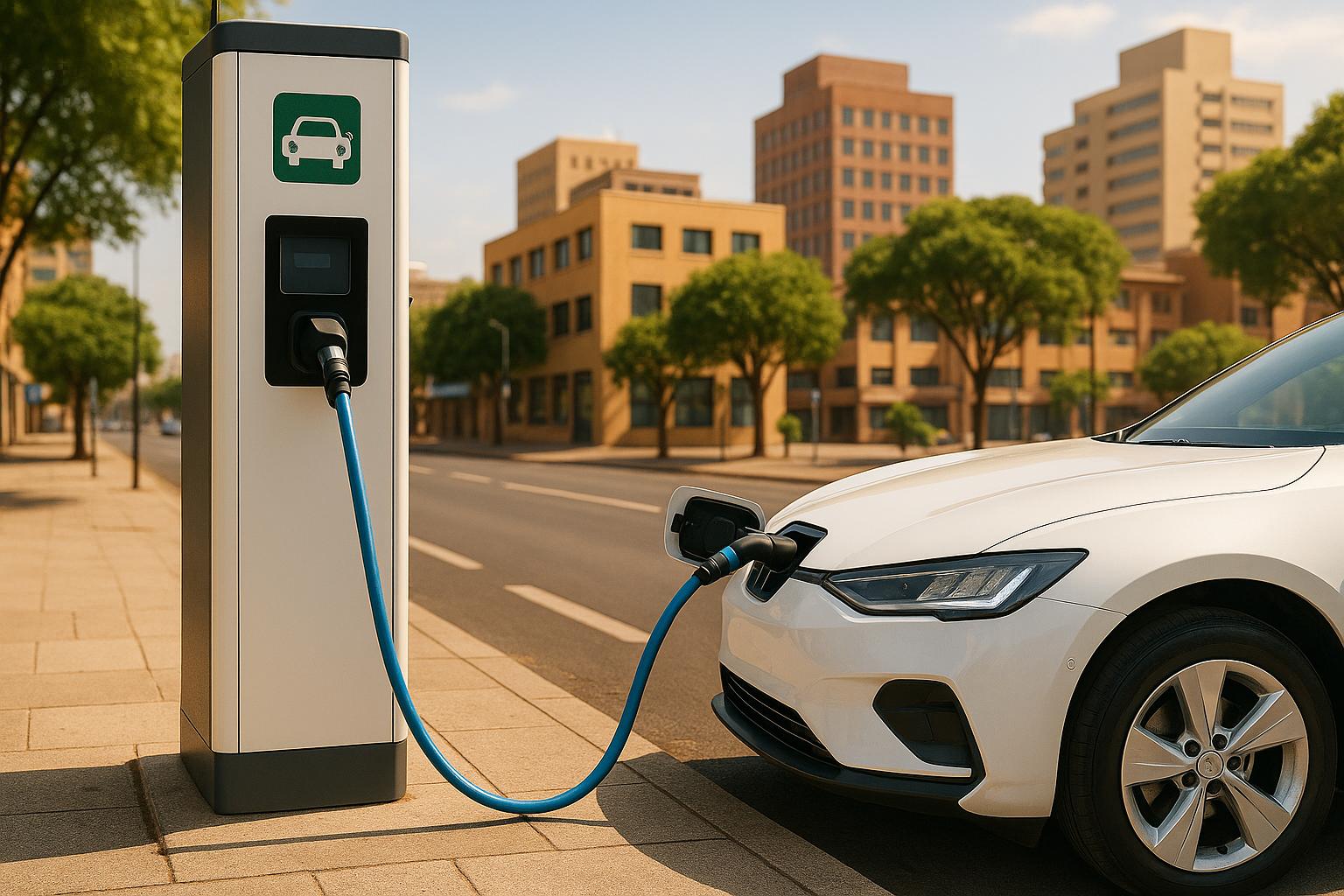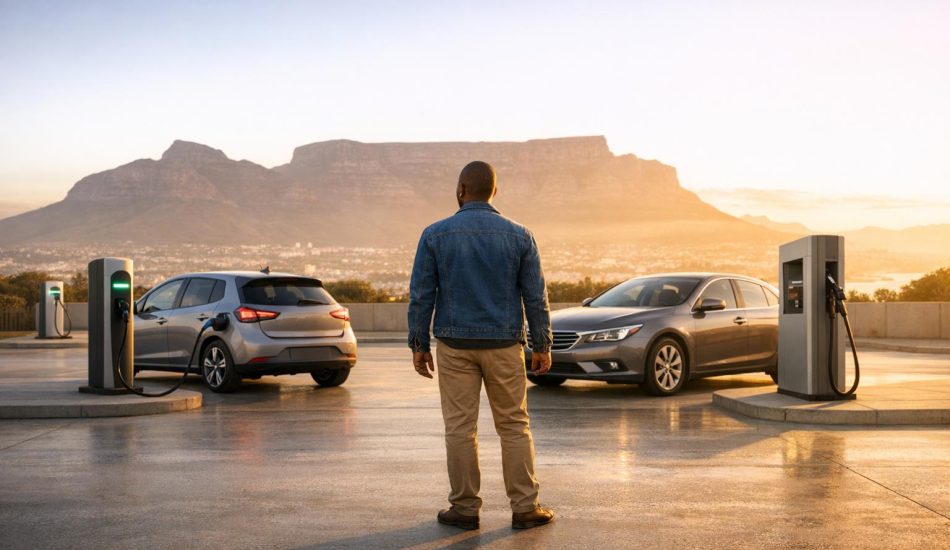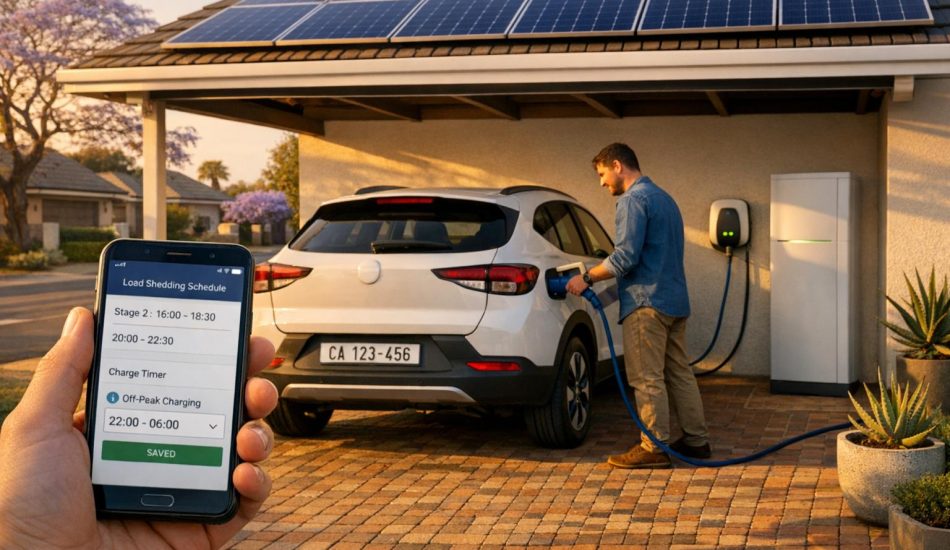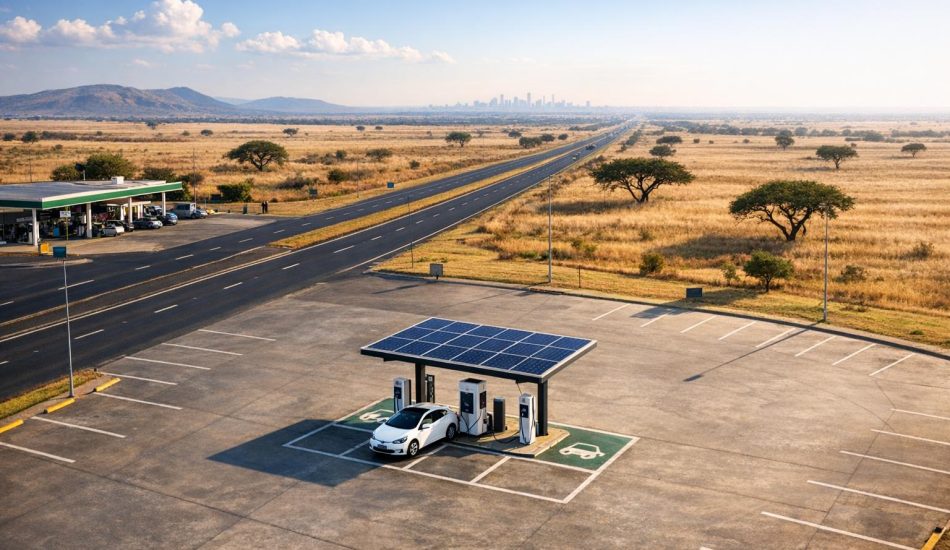
Africa’s electric vehicle (EV) market is evolving, with new policies, infrastructure developments, and financial considerations shaping the import process. Here’s what you need to know for 2025:
- Policies: Countries like Ethiopia, Kenya, and Rwanda offer tax breaks or exemptions, while others enforce strict compliance rules. Ethiopia has banned internal combustion engine (ICE) vehicles entirely.
- Infrastructure: Charging stations are growing in major cities, but rural areas still face gaps. Solar-powered solutions are emerging in some regions.
- Costs: Beyond the car price, factor in import duties, shipping fees, and certification costs. For example, South Africa imposes a 25% import duty plus 15% VAT.
- Top Models: BYD, Leapmotor, and other Chinese brands dominate, offering affordable options tailored to local needs.
- Support Services: Platforms like EV24.africa simplify imports, handling logistics, compliance, and after-sales support.
For buyers, understanding local regulations, evaluating charging infrastructure, and planning total costs are essential steps to make informed decisions. Import platforms can ease the process, ensuring a smoother transition to EV ownership.
Chinese EVs You Can Buy in Kenya – Africa EV Show
Africa’s EV Market Changes in 2025
Africa’s electric vehicle (EV) market is undergoing remarkable shifts, reshaping import strategies across the continent. These changes bring a mix of opportunities and challenges that demand careful attention.
Government Policies and Plans
Governments across Africa are rolling out reforms aimed at accelerating EV adoption. For example, Ethiopia has taken a bold step by banning the import of internal combustion engine (ICE) vehicles entirely, allowing only EVs into the country. Zimbabwe has reduced its import duty on EVs from 40% to 25%, effective January 1, 2025. Morocco has introduced attractive tax incentives, including VAT exemptions and reduced import duties, alongside a digital customs system that speeds up processing times. Kenya is pushing for 5% of all newly registered vehicles to be electric by 2025, backed by zero-rated VAT and import duty exemptions. Similarly, Rwanda has removed VAT, import, and excise duties on electric cars, spare parts, batteries, and charging equipment. These policy changes are laying the groundwork for significant market expansion, as evidenced by the growing interest from investors.
Market Growth and Investment Trends
By 2025, Africa’s new energy vehicle market is expected to surpass 30,000 units, with Chinese brands projected to claim around 60% of the market share. Local manufacturing is also gaining traction, with Morocco ramping up its production capacity to align with its renewable energy targets. International financing programs and rebates are emerging, making EVs more accessible. Agreements like the China-Africa Free Trade Agreement are further easing the financial burden through VAT exemptions on qualifying imports. These developments, coupled with regulatory changes, are spurring innovation and investment in the EV sector.
Major EV Industry Companies
A variety of industry players are stepping up to meet the growing demand for EVs in Africa. Chinese brands such as BYD, Ora, and MG are leading the charge with models designed to meet African regulations, including right-hand drive configurations. EV24.africa, a platform described as "the first online marketplace to buy electric cars for Africa", operates across all 54 African countries, simplifying the import process with logistics and compliance support.
BYD has made a strong impression with models like the BYD ATTO 3 2025 ($47,500) and the more affordable BYD DOLPHIN ACTIVE ($11,800). Other contenders include Leapmotor, offering vehicles such as the LEAPMOTOR C11 PERFORMANCE ($31,300) and the budget-friendly LEAPMOTOR T03 (starting at $9,500). Dongfeng and Geely also cater to various price points with options like the DONGFENG eπ 008 EV ($28,700) and the GEELY PANDA MINI BASE ($5,880).
In addition to vehicle manufacturers, companies like Charge Ninja and Wancheng EV Car are providing aftersales support and facilitating smoother import processes. Global luxury brands, including Tesla, Volkswagen, XPeng, Changan, Mercedes-Benz, Citroën, Peugeot, and AITO, are also entering the African market with their EV offerings. This growing diversity in brands and price points ensures buyers have more options, better features, and improved support, which is driving advancements in import logistics and financing solutions across the region.
Import Rules and Benefits by Country
Understanding electric vehicle (EV) import rules across Africa requires familiarity with each nation’s unique regulations and incentives. Some countries offer enticing tax breaks, while others enforce strict compliance measures.
Import Requirements and Documents
South Africa has some of the toughest import regulations on the continent. Importers need an Import Permit from the International Trade Administration Commission (ITAC) and must adhere to South African Bureau of Standards (SABS) regulations. Only right-hand drive vehicles are allowed in the country. Required documents include personal or business identification, proof of purchase, and vehicle specifications. SABS compliance certification costs roughly $2,100 per vehicle model.
Kenya imposes an eight-year age limit on imported vehicles and requires both a Pre-Export Certificate of Conformity (PVOC) and a Certificate of Conformity (COC). The COC for East African Community countries starts at $800. Importers must also provide a bill of lading, a commercial invoice, and an import license.
Morocco enforces strict technical and environmental standards for EV imports. Vehicles must meet minimum battery capacity requirements, be fully electric, and demonstrate compatibility with local charging infrastructure. Required paperwork includes a COC, environmental compliance certificates, manufacturer certifications, and digital customs documentation. Morocco’s digital customs system has significantly reduced processing times.
Nigeria typically requires SONCAP certification, which costs $2,000 per car model. The country also enforces age and emission standards that need verification before shipment.
Common mistakes include missing age restrictions, lacking necessary certificates, or not submitting electronic cargo tracking documents. Such errors can lead to fines, delays, or even rejection of cargo at ports.
With these regulations in mind, let’s explore the financial perks available to EV buyers across the continent.
Buyer Benefits and Tax Savings
EV import incentives differ widely across African markets, offering financial advantages to informed buyers. Countries like Zimbabwe, Rwanda, Kenya, and Morocco lead the way with notable tax exemptions and reduced duties.
Rwanda offers the most extensive benefits, exempting electric cars, spare parts, batteries, and charging equipment from VAT, import duties, and excise taxes. Zimbabwe has reduced its EV import duty from 40% to 25%, effective January 1, 2025. Kenya provides zero-rated import duties for EVs, aiming for 5% of new vehicle registrations to be electric by 2025.
Morocco provides zero customs duty and VAT exemptions for qualifying EVs, a big incentive compared to the standard 20% VAT rate. These benefits align with Morocco’s renewable energy goals, which aim to source more than 50% of the nation’s energy from renewables by 2030.
Nigeria and South Africa have reduced import tariffs on pure EVs to below 5% in some cases, depending on the vehicle type and trade agreements. However, South Africa still applies a 25% import duty and 15% VAT on most EVs. Tax reductions are possible through regional trade agreements.
Ethiopia has taken a bold step by banning the import of internal combustion engine vehicles entirely, allowing only EVs. This creates a unique opportunity for electric vehicle importers.
| Country | Import Duty | VAT/Tax | Key Benefits |
|---|---|---|---|
| Rwanda | 0% | 0% | Full exemption on EVs and equipment |
| Morocco | 0-reduced | 0-20% | Duty/VAT exemptions for qualifying EVs |
| Zimbabwe | 25% | Varies | Lowered from 40% starting in 2025 |
| Kenya | 0% | 0% | Zero-rated duties for EVs |
| South Africa | 25% | 15% | Reduced tariffs via trade agreements |
| Nigeria | <5% | Varies | Lower tariffs for pure EVs |
These incentives highlight how tailoring import strategies to each country can lead to substantial savings.
Using EV24.africa for Imports

EV24.africa simplifies the EV import process across all 54 African countries by handling customs clearance, local registration, and regulatory compliance.
"At EV24.africa, we simplify the process of importing and buying electric vehicles in Africa. Our expertise streamlines the import process, letting you focus on the EV benefits."
The platform offers real-time updates on regulatory changes, such as Algeria’s stricter age limits and expanded vehicle eligibility starting in 2025. This ensures buyers stay ahead of compliance requirements and capitalize on new incentives.
EV24.africa connects buyers with trusted suppliers and service providers, offering transparent pricing and a Full Support & Compliance service. This includes everything from customs clearance to local registration, removing the complexity of navigating different national rules.
For importers on tight budgets, EV24.africa advises setting aside a contingency fund of about 3% of cargo value to cover potential customs delays or demurrage fees, especially at busy ports like Lagos. This practical tip helps avoid unexpected costs.
The platform’s expertise is particularly useful in countries like Morocco, where meeting technical criteria and leveraging the digital customs system can lead to faster processing and significant tax savings. Similarly, in South Africa, partnering with experienced exporters and using local customs agents ensures smooth clearance while meeting all SABS and ITAC requirements.
Charging Infrastructure and Power Solutions
Africa’s charging network is growing, but there are still notable gaps that potential EV buyers should think about before importing a vehicle. Charging station availability and development differ widely across countries, reflecting varying levels of investment and preparedness in the market.
Charging Station Locations
Established charging stations are typically found in major cities and along key travel routes, often near commercial areas and public spaces. However, rural and less developed regions still have limited charging options. Before making an EV purchase, it’s essential to assess the local charging infrastructure to ensure it aligns with your daily commute and travel needs. These stations are also opening doors for renewable energy applications, which we’ll delve into next.
Solar Power and Clean Energy
Africa’s abundant sunlight makes solar-powered charging stations a practical option, especially in areas where grid reliability is a concern. By incorporating renewable energy into EV infrastructure, these stations can reduce reliance on national grids while promoting energy efficiency. Such solutions not only enhance local energy independence but also align with broader environmental goals, as we’ll see in regional collaborations.
Cross-Border EV Networks
Efforts are underway in parts of East, West, and Southern Africa to tackle the challenges of cross-border EV travel. These initiatives aim to standardize charging infrastructure and payment systems across neighboring countries, making it easier for EV owners to travel between borders. While technical standards still vary from one country to another, ongoing collaborations are working to harmonize these requirements and integrate local payment methods. This growing network is a key step toward making international EV travel more seamless and convenient, which ties into informed EV model choices discussed later.
sbb-itb-99e19e3
Best EV Models and Pricing
As Africa’s electric vehicle market grows, selecting the right EV model and understanding the total costs involved are key steps for a smooth importing experience. The African market has distinct preferences and requirements, setting it apart from other regions.
Top EV Models for Africa
Chinese manufacturers dominate Africa’s EV market, holding an impressive 60% market share due to their competitive pricing and reliable performance.
The BYD Atto 3 is a standout choice for African buyers. Its dual-mode charging and upgraded suspension make it ideal for handling the region’s rougher terrains. Other popular options include the Ora Good Cat and MG4 EV, especially in South Africa, where right-hand drive vehicles are a legal requirement.
Although brands like Hyundai, Nissan, and Tesla are available, their presence is smaller. These options may vary in terms of service networks and parts availability depending on your country or region.
For details on specific country requirements and import regulations, refer to earlier sections. Next, let’s break down the costs to help you plan your budget.
Complete Cost Breakdown
Knowing the total landed cost is essential for budgeting your EV purchase. New EVs generally range from $25,000 to $45,000, while used models are available for $15,000 to $30,000.
Here’s an example: A South African buyer spent $28,000 on a BYD Atto 3. Additional costs included:
- $10,000 in tariffs
- $2,000 for shipping
- $1,500 in certification fees
- Total: approximately $41,500
These costs highlight the combined impact of import duties, shipping, and certification fees, all of which can vary by country.
Import Duties
Duties and taxes differ widely across Africa. In South Africa, you’ll face a 25% import duty on the vehicle’s value, plus 15% VAT on the customs value. Nigeria offers better terms, with EVs exempt from Import Adjustment Tax and VAT, though a 15% NAC levy still applies. Morocco, on the other hand, offers reduced customs duties and VAT exemptions for qualifying EVs, making it an attractive option in North Africa.
Certification Fees
Certification adds another layer to your budget. For example, SABS certification in South Africa costs approximately $2,070, while Nigeria’s SONCAP certification is about $2,000 per car model. If you’re importing to East African Community countries, a Certificate of Conformity starts at $800.
Additional Expenses
Other costs to consider include shipping fees, which typically range from $1,500 to $3,000, port handling charges, inland transport, and insurance. To avoid surprises, experts suggest setting aside 3% of the cargo value as a reserve for potential customs delays.
Financing and Support Services
Once you’ve grasped the costs, it’s time to explore financing options and support services to simplify the process. Common financing choices include auto loans, leasing, and green financing programs, which often feature lower interest rates and longer repayment terms.
Platforms like EV24.africa provide end-to-end support for importing EVs. They offer flexible payment options, clear pricing with no hidden fees, and after-sales support, including parts sourcing and assistance with local registration and maintenance.
"No hidden costs, clear quotes, and support for flexible payment solutions." – EV24.africa
EV24.africa also manages complex documentation, coordinates shipping and customs clearance, and provides ongoing support after delivery. Their services even extend to home charger installations and connecting buyers with local service networks.
Some banks and financial institutions collaborate with import platforms to offer tailored EV financing packages. Additionally, international development agencies may support zero-emission vehicle purchases in countries with strong environmental goals.
For instance, a South African buyer who used EV24.africa praised the platform for streamlining the entire process, from selecting the vehicle to final registration. Their EV performed well on local roads, and the savings on fuel and maintenance helped offset the higher upfront investment.
How to Import EVs Successfully
Bringing an electric vehicle (EV) into Africa involves a series of detailed steps, and careful planning is key to avoiding unnecessary hurdles. From researching regulations to finalizing local registration, understanding the process can make all the difference.
Import Process Steps
The journey to successfully importing an EV starts long before the car is shipped. The first step is understanding your destination country’s specific import requirements. These might include restrictions on vehicle age, emission standards, or whether left-hand or right-hand drive vehicles are allowed. For instance, South Africa only permits right-hand drive vehicles for import and registration.
Next, gather all necessary permits and certifications. These documents must be verified prior to shipment to ensure compliance with local laws. Be aware that some countries require additional certifications. For example, South Africa’s SABS certification costs about $2,100 per vehicle model, while Nigeria’s SONCAP certification is approximately $2,000 per model.
When it comes to shipping, you’ll need to choose between roll-on/roll-off (RoRo) or container shipping. In Morocco, the 2025 electronic customs system now mandates digital submission of all import documents, replacing traditional paper-based processes.
Customs clearance is another critical step. This involves paying duties and taxes, which vary by country. For example, South Africa imposes a 25% import duty plus 15% VAT, while Nigeria applies a 10–20% import duty along with a 15% National Automotive Council levy. However, EVs in Nigeria are exempt from VAT and the Import Adjustment Tax. Once these payments are made, your vehicle will undergo safety and compliance inspections before being released.
The final step is local registration. Your EV must pass all compliance checks and meet technical standards to receive registration plates and documentation.
Now that you know the steps, let’s explore strategies to tackle common challenges during the import process.
How to Avoid Common Problems
Even with a clear roadmap, importing EVs can present challenges. One common issue is documentation errors. Double-check that all documents, including vehicle identification numbers, specifications, and buyer details, are accurate and consistent. Partnering with experienced customs agents familiar with local regulations can help minimize mistakes.
Regulatory changes are another hurdle. EV import policies can change unexpectedly, so stay informed by regularly checking government websites and maintaining contact with regulatory agencies.
Technical compliance is also crucial. Your EV must meet local standards, including having certified battery safety features and compatible charging ports. In some instances, additional compliance certificates or detailed documentation about the battery may be required.
Shipping delays can lead to extra costs, such as fines or extended port storage fees. To avoid these, work with reputable shipping companies that have experience in African markets. Ensure that all electronic tracking documents and pre-declaration materials are submitted on time.
Lastly, hidden costs can surprise first-time importers. Beyond the vehicle’s purchase price, factor in expenses like import duties, VAT, shipping fees, port handling charges, inland transport, and insurance. Planning your budget with these costs in mind can help you avoid financial surprises.
By addressing these potential pitfalls, you can make the import process much smoother. For an even easier experience, platforms like EV24.africa offer tailored support.
Using EV24.africa for Easy Imports
EV24.africa simplifies the entire EV import process by taking care of the complexities, from documentation to logistics. Their platform handles every step – from selecting a vehicle to final delivery – eliminating many of the challenges individual importers face.
The service starts with a curated selection of certified vehicles from trusted suppliers, ensuring that every vehicle meets the destination country’s requirements. Transparent pricing gives you a clear breakdown of all costs, including duties and fees, so there are no surprises.
"At EV24.africa, we simplify the process of importing and buying electric vehicles in Africa. Our expertise ensures a seamless, transparent, and stress-free experience, so you can focus on driving the future of mobility."
- EV24.africa
EV24.africa also provides end-to-end logistics support, coordinating shipping, customs clearance, and local registration. They work with experienced customs agents and shipping companies to reduce delays and ensure accurate documentation.
Beyond delivery, their after-sales support adds even more value. They assist with sourcing parts, connecting buyers with local service networks, and arranging home charger installations – a critical service in regions where EV infrastructure is still developing. Their door-to-door service includes inland transport from ports to your final destination, ensuring your EV arrives ready to hit the road.
Key Points for EV Buyers
If you’re planning to import an electric vehicle (EV) to Africa in 2025, there are three main areas to focus on: understanding local policies, evaluating infrastructure readiness, and calculating the total costs. These elements are critical to navigating the complexities of EV imports successfully.
1. Local Policies and Regulations
Every African country has its own set of import rules, and these can vary widely. For instance, South Africa has specific vehicle orientation requirements that could complicate the process. Additionally, regulations are frequently updated, so staying informed is essential to avoid unexpected hurdles.
2. Infrastructure Readiness
Charging infrastructure across Africa is still developing and often unevenly distributed. Urban areas and countries like South Africa and Morocco are leading the way with innovations like solar-powered charging stations. However, rural regions may still face significant gaps in access. Researching local charging options and exploring home charging solutions can help you prepare for these challenges.
3. Total Cost Planning
Importing an EV involves more than just the purchase price. You’ll need to account for import duties, certification costs, shipping fees, port charges, and local registration expenses. These costs can add up quickly, making it important to plan carefully. Enlisting professional assistance can simplify the process and help you avoid costly mistakes.
Platforms such as EV24.africa can make the process easier by handling documentation, customs clearance, and registration, all while providing clear pricing.
Africa’s EV market is expanding quickly, but success depends on preparation. By staying informed, organizing your paperwork, and working with experienced professionals, you can navigate the import process smoothly and efficiently.
FAQs
What should car buyers know about electric vehicle import regulations in African countries?
Importing electric vehicles (EVs) into African countries comes with a variety of regulations, which can greatly influence the process. Here’s a snapshot of how some nations handle EV imports:
- Kenya: New EVs enjoy reduced import duty and VAT. While right-hand drive vehicles are preferred, they aren’t mandatory.
- Nigeria: Import duties range from 10% to 20%, but EVs are exempt from VAT and the Import Adjustment Tax.
- Morocco: Buyers may benefit from VAT exemptions or reduced VAT rates as part of the country’s incentives.
- Ethiopia: Taxes depend on the vehicle’s assembly state. Fully assembled EVs are taxed at 15%, semi-knocked down kits at 5%, and completely knocked down kits for local assembly are tax-free.
To navigate the import process effectively, it’s crucial to understand these regulations. Additionally, consider factors like the target country’s infrastructure for EVs and any available incentives to make well-informed decisions.
What is the current state of EV charging infrastructure in Africa, and how does it differ between urban and rural areas?
Africa’s electric vehicle (EV) charging network is expanding, but it’s still in its early stages. Only a handful of countries across the continent have more than 10 public charging stations. Access to these facilities is generally better in urban areas, thanks to more reliable power grids and a growing demand for EVs. On the other hand, rural regions often face hurdles like inconsistent electricity, making charging less reliable.
For anyone thinking about buying an EV, it’s important to assess the charging options available in your area. If you live in or regularly travel to rural locations, be prepared for possible charging delays. You might want to consider alternatives like installing a home charging station or investing in a portable charger to ensure you’re covered.
What incentives and tax breaks are available for importing electric vehicles into Africa, and how do they affect ownership costs?
Many African nations are rolling out financial incentives and tax breaks to make electric vehicles (EVs) more accessible and affordable. These measures aim to lower the overall cost of owning an EV, encouraging wider adoption.
Take Rwanda, for example. The country has introduced a range of exemptions – covering import duties, VAT, excise duties, and withholding taxes – for EVs. These exemptions are in place until June 30, 2028, making Rwanda a standout in the region. Ethiopia, on the other hand, has removed taxes on EV spare parts and reduced import taxes to 15% for fully assembled EVs and just 5% for semi-knocked down kits. In contrast, South Africa takes a different approach, applying a 25% import duty on EVs, which is notably higher than the rates in many neighboring countries.
While these policies can significantly lower costs, it’s crucial to dig into the specific regulations in your chosen country. This will help you fully understand the financial implications of importing an EV.




